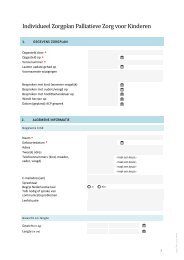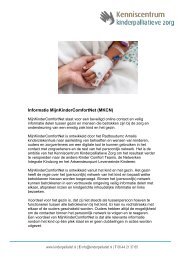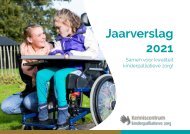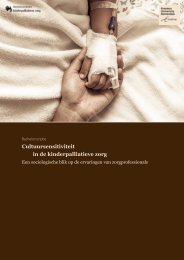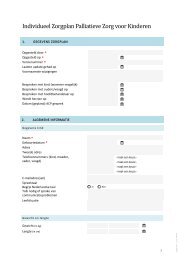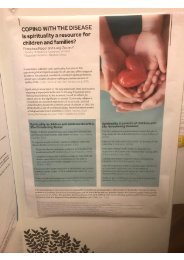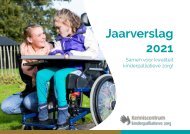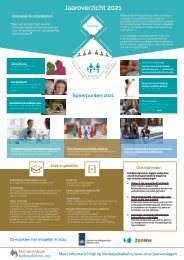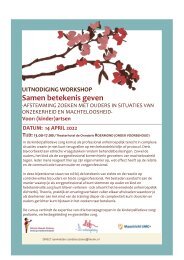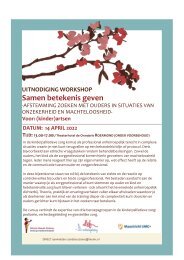EAPC Atlas of Palliative Care in Europe 2019
Conclusion: PC health policies developed in recent years have promoted vigorous development across Europe. Preliminary data on the integration of PC into different fields are encouraging though inequalities between countries and sub-regions persist. Further comparative analysis exploring factors leading to uneven progress may inform strategies to provide PC for all people in need. Per land is de stand van zaken van de (kinder)palliatieve zorg weergegeven.
Conclusion: PC health policies developed in recent years have promoted vigorous development across Europe. Preliminary data on the integration of PC into different fields are encouraging though inequalities between countries and sub-regions persist. Further comparative analysis exploring factors leading to uneven progress may inform strategies to provide PC for all people in need.
Per land is de stand van zaken van de (kinder)palliatieve zorg weergegeven.
Create successful ePaper yourself
Turn your PDF publications into a flip-book with our unique Google optimized e-Paper software.
Foreword<br />
PRESENTATION<br />
B<br />
Phil Lark<strong>in</strong><br />
President, <strong>EAPC</strong><br />
This is the third edition <strong>of</strong> the <strong>EAPC</strong> <strong>Atlas</strong> <strong>in</strong><br />
<strong>Europe</strong>. As <strong>in</strong> previous editions, the <strong>Atlas</strong><br />
has only come to fruition through the dedicated<br />
work <strong>of</strong> Pr<strong>of</strong> Carlos Centeno, ATLAN-<br />
TES, University <strong>of</strong> Navarra, Spa<strong>in</strong> and his team led on<br />
this occasion by Natalia Arias Casais. We owe the team<br />
our immense gratitude for this exemplary work which<br />
has grown <strong>in</strong> both scope and vision s<strong>in</strong>ce the orig<strong>in</strong>al<br />
version <strong>in</strong> 2007.<br />
The third edition presents data from 51 countries on<br />
the ‘state <strong>of</strong> the art’ <strong>of</strong> palliative care at national and<br />
regional level. The scientific rigour <strong>of</strong> the process <strong>of</strong><br />
data assimilation, <strong>in</strong>clud<strong>in</strong>g systematic reviews and<br />
a Delphi process attests to the quality <strong>of</strong> evidence<br />
regard<strong>in</strong>g the contemporary <strong>in</strong>tegration <strong>of</strong> palliative<br />
care and enabled specific <strong>in</strong>dicators to be developed<br />
for new and specialized areas <strong>of</strong> practice, <strong>in</strong>clud<strong>in</strong>g<br />
palliative care for children, primary care and the role<br />
<strong>of</strong> volunteers.<br />
It is reward<strong>in</strong>g to see that palliative care cont<strong>in</strong>ues to<br />
<strong>in</strong>crease its presence <strong>in</strong> ma<strong>in</strong>stream healthcare and<br />
despite the ongo<strong>in</strong>g variance between East and West,<br />
there are champions who take the lead <strong>in</strong> mak<strong>in</strong>g the<br />
case for the vitality and importance <strong>of</strong> palliative care<br />
for all citizens. There are also clear <strong>in</strong>dicators <strong>of</strong> development,<br />
notably <strong>in</strong> palliative care children and neonatology<br />
and education, which is start<strong>in</strong>g to be embedded<br />
<strong>in</strong> curricula to help prepare our practitioners for<br />
the future.<br />
The new <strong>Atlas</strong> also rem<strong>in</strong>ds that we can never be complacent<br />
about the development <strong>of</strong> palliative care. We<br />
need a concerted <strong>Europe</strong>an effort to support those for<br />
whom palliative care is <strong>in</strong> its <strong>in</strong>fancy and to strengthen<br />
our political voice for equity and access to palliative<br />
care for all. The work <strong>of</strong> Pr<strong>of</strong> Centeno and his team<br />
provides us with the tools to do that important work.<br />
The new edition is presented <strong>in</strong> a clear, accessible<br />
way which captures key <strong>in</strong>formation <strong>in</strong> a succ<strong>in</strong>ct and<br />
<strong>in</strong>stantly deliverable manner. As well as a regional overview,<br />
country reports are provided (as <strong>in</strong> earlier editions)<br />
but with greater development <strong>in</strong> terms <strong>of</strong> visual<br />
detail on service provision. Overall, the <strong>EAPC</strong> <strong>Atlas</strong> <strong>of</strong><br />
<strong>Europe</strong> provides cl<strong>in</strong>icians, policy makers and educators<br />
with critical <strong>in</strong>formation for future growth.<br />
Globally, this will add to the capacity for benchmark<strong>in</strong>g<br />
and comparison across not only <strong>Europe</strong> but with other<br />
works by the same group <strong>in</strong> Africa and Lat<strong>in</strong> America.<br />
The third edition is a remarkable achievement, and our<br />
thanks go not only to the team but to all the national<br />
associations and colleagues across <strong>Europe</strong> that have<br />
contributed to this through documentation, complet<strong>in</strong>g<br />
questionnaires or support<strong>in</strong>g the scientific studies<br />
which underp<strong>in</strong> the work. The new <strong>Atlas</strong> is a critical<br />
example <strong>of</strong> ‘ one voice, one vision’, a strategic document<br />
to aid better care for people with palliative care<br />
needs <strong>in</strong> the years ahead.<br />
<strong>EAPC</strong> <strong>Atlas</strong> <strong>of</strong> <strong>Palliative</strong> <strong>Care</strong> <strong>in</strong> <strong>Europe</strong><br />
13




